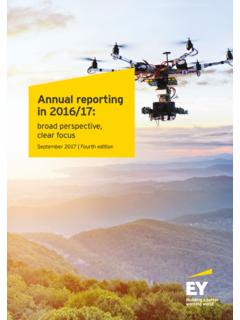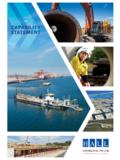Transcription of Managing bribery and corruption risks in the oil …
1 Managing bribery and corruption risks in the oil and gas industry The global nature and scale of the oil and gas sector, and the complexity of the working and contractual relationships with governments, venture partners, suppliers and other contractors, make compliance with anti- bribery and anti- corruption regulation something that requires significant management bribery and corruption risks in the oil and gas industry2 Introduction 4 Why oil and gas? 5 Compliance pressure points 7 Responding to the challenge 11 Eight steps to an effective anti- corruption compliance program 13 How EY can help 17 Conclusion 19 Contacts 21 Contents3 Managing bribery and corruption risks in the oil and gas industryManaging bribery and corruption risks in the oil and gas industry4 bribery and corruption risk is becoming an increasing concern for businesses.
2 And company executives and firms operating in the oil and gas sector are among those that have incurred the most significant penalties. In its most recent Bribe Payers Index, Transparency International identified companies in the oil and gas sector as being perceived to be more likely to bribe than those in other sectors; it was in the bottom 25% of 19 commodity prices and a growing energy demand, alongside a tightening of access to reserves and advances in technology, have seen oil and gas companies increasing their exploration activities, reinvesting in capital projects and undertaking aggressive merger and acquisition (M&A) activity.
3 The need for growth is driving companies to expand further into markets that may have traditionally been regarded as too difficult, too expensive or too risky. As the commercial and operational risk profiles of companies change, consideration needs to be given to the identification and management of bribery and corruption to the importance of Managing corruption risk is the increase in anti- corruption legislation with a global reach. This has extended senior management s accountability beyond the functional, operational and jurisdictional remits of the past. This trend is expected to continue as more countries seek to refresh and internationally align their anti- bribery and anti- corruption (ABAC) legislation.
4 Not only does increased regulation and scrutiny aid in protecting both public and private sector finances, it also contributes to an organization s social license to operate. The endorsement a project receives from local stakeholders outside of regulatory approval is a relatively new concept, but one that is gaining momentum, particularly in the oil and gas sector. The promotion of ethical conduct and contribution to the well-being of local communities are critical factors in attaining this; failure to obtain local support has the potential to block agencies are responding to the mounting pressure for public and private sector organizations to take steps to eliminate bribery and corruption by pursuing prosecutions and imposing sanctions.
5 Penalties for violating ABAC legislation are severe and include imprisonment, unlimited fines and reputational damage. The global nature and scale of the oil and gas sector, and the complexity of the working and contractual relationships with governments, venture partners, suppliers and other contractors, make compliance with all the various ABAC regulations something that requires significant management focus. The bribery Act in the UK, for example, has a wider reach than the US Foreign Corrupt Practices Act (FCPA), and businesses already subject to the requirements of the FCPA recognizing that compliance with the FCPA does not automatically ensure compliance with the bribery Act.
6 Greater transparency of payments to governments is also demanded by the US Dodd-Frank Wall Street Reform and Consumer Protection Act. Companies registered with the US Securities and Exchange Commission (SEC) are required to disclose in their annual reports payments made to any non-US government for purposes of the commercial development of oil, natural gas or this publication, we discuss why bribery and corruption are ongoing challenges for the oil and gas sector and outline practical considerations for companies looking to manage corruption Bribe Payers Index 2011, Transparency International 5 Managing bribery and corruption risks in the oil and gas industryWhile ABAC enforcement actions have been seen in a number of industries.
7 The oil and gas sector has been subject to numerous high profile cases. This is not because individuals or companies who operate in this sector are more corrupt or susceptible to bribery , but there are characteristics of the sector that increase the risks . Conducting business in emerging marketsAs natural resources in more established markets become scarce and companies look to access new reserves, there is an increasing requirement to explore and operate in countries where there is perceived to be a high level of corruption . Unstable political situations and the lack of infrastructure and controls necessary to combat corruption can make these locations inherently example, Africa, Latin America, Asia and the Middle East are all key growth markets for the oil and gas sector.
8 In general, countries in these locations tend to have lower rankings on Transparency International s corruption Perceptions Index, indicating that there is perceived to be a higher level of in numerous and diverse locations presents a challenge when attempting to implement business policies and procedures. Working across countries with differing cultures, as well as differing access to technology, adds to the challenge. In-country employees and other stakeholders may be accustomed to a particular way of operating and, as a result, modify or bypass global policies to proceed with business activity that may be fraudulent or dealings with government officials Many organizations involved in the oil and gas sector are either wholly or partially state-owned, and their employees are likely to be considered foreign officials under bribery and corruption legislation around the world.
9 Emerging markets tend to be excessively bureaucratic, which results in many touch points with government where bribes can be some markets, government officials have relatively low salaries compared with those in the private sector, raising the temptation for them to take bribes to supplement their incomes. But this is not just restricted to cash bribes. Even small gifts, meals or entertainment that might be considered de minimis in other countries may be perceived as attempts to improperly influence decision-making, requiring carefully considered policies, training and high number of interactions with government across all levels of the oil and gas business increases the risk of corrupt practices influencing policy and officials using their positions of power to solicit reliance on third parties Oil and gas companies often hire third parties to manage their on-the-ground transactions.
10 Under the FCPA in the US and most other international anti- corruption legislation, companies may be liable for corrupt payments or other benefits provided to government officials by those third parties. Under the UK bribery Act, the company will be liable for an associated person s bribery if it is intended to obtain or retain business, or a business advantage, for the control over third parties is a significant challenge. Many enforcement actions, particularly in the US, relate to parent companies being held responsible for the behavior of their agents and intermediaries when performing services on behalf of the parent or local oil and gas?















